While almost every animal in Kingdom of the Planet of the Apes was computer generated, one particular species was practical: the leeches on the bodies of the entire crew.
“Everyone was just crawling with leeches and they got everywhere because you don’t feel them,” director Wes Ball told io9 last week. “We’re shooting in these fields and it’s just like infestation. And people for days were like, ‘Oh, god’ and suddenly… you realize there’s been a leech latching on to you and your foot is covered in blood. It was just one of the many sacrifices we made for the audience.”
Ball spoke to io9 not only about the leeches on set for his new Planet of the Apes sequel, but also the action sequence he couldn’t film because it was too expensive, why there are so many eagles in the movie, working with previous filmmakers Matt Reeves and Andy Serkis, and much, much more.
Read the full, non-spoiler interview below and check back next week for Ball’s spoilery thoughts on the film’s ending, the future of the franchise, and that shocking opening.
This interview has been edited for length and clarity.
Germain Lussier, io9: So I read that you initially were a little hesitant about tackling this franchise, but then had an idea that made you decide to do it. Tell me what it was that made you not want to do it—and what made you actually do it?
Wes Ball: You didn’t need to continue the trilogy in a way, right? It had a perfect little beginning, middle, and end. There was no reason to go back into it. I understand people wanted to see what would happen to [Caesar’s] son and those kinds of things, but I didn’t. I didn’t see how you would stretch a lot of story out of that. And you don’t want to be a part four. Part fours don’t work, typically. You know, beginning, middle, end. We’re wired for that. One, two, three. And so the question was: could I find a way to do our own thing but still not abandon the storyline that came before? I think we found a way to do it. Hopefully fans will appreciate it. Audiences who haven’t seen those movies will also still find value in it all and meaning in the story.
But that was kind of the goal for me: can we do our own thing that was a story of its own that’s worth telling, that fits into not just the previous trilogy, but the full legacy of these movies? There’s been nine movies before us. How do we kind of fit into that DNA? And I think part of that was having Rick [Jaffa] and Amanda [Silver] coming out on a board early on and helping to kind of craft that trajectory forward. Hopefully, we’ve done it for people, we’ll see.
io9: Right, I know you had [writers/producers] Rick and Amanda as a part of this, but did you talk to Matt [Reeves] and Rupert [Wyatt] specifically about what it’s like to work on these movies?
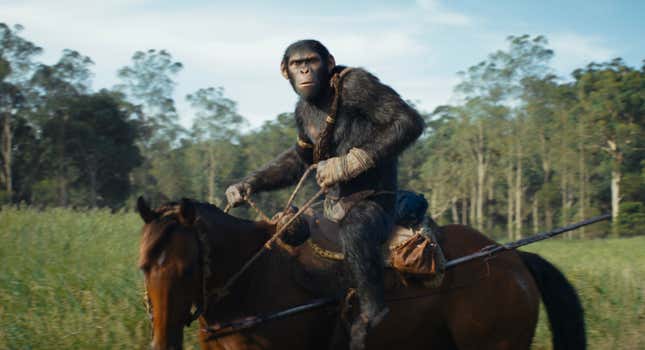
Ball: Not Rupert, but Matt I had known on Mouse Guard. Two years before, we had known each other. And I picked his brain about the mocap and all that kind of stuff that he did on Apes. [Mouse Guard] was a different process because we were going to be full CGI there, but still the same performance capture stuff. So I got my feet wet there. And he was always a great source of experience and wisdom for that. And I met Andy [Serkis] because I cast him in that movie, too. So I met both those guys and I knew them.
So when this happened, I had dinner with Matt early on and told him what I was thinking, where I was thinking about going, where I could go. I think he was literally on a plane to go do Batman. And I got the sense that he said, “I did mine, go [do yours]. Thumbs up.” And I felt confident in that. And then Andy, I just kept in touch with Andy just to kind of ask, “Hey, are we getting this right?” Obviously, Caesar is hanging over this movie in an important way and I said he’s the Ape Godfather for us. If he told me that this was terrible, I would have walked away.
io9: I know he also officially consulted on this movie too. Did you ask him to do that and what was that conversation like?
Ball: Yeah. He’s cool. He’s the nicest, most generous guy ever. I was like “Andy, can I show you the stuff?” He was like, “Dude, come on.” I sent him the script, I sent him this gigantic pack of concept art to get a sense of what the visual of the movie was going to be. We talked for a few hours or something over Zoom [while] I was in Australia. And then he came on and I asked him to go talk to the actors. The actors have never done this before. And he gave them his wisdom [on] how you trust this process, how you can mentally kind of prepare for it. He was just a cool dude, man. Greatest guy ever.
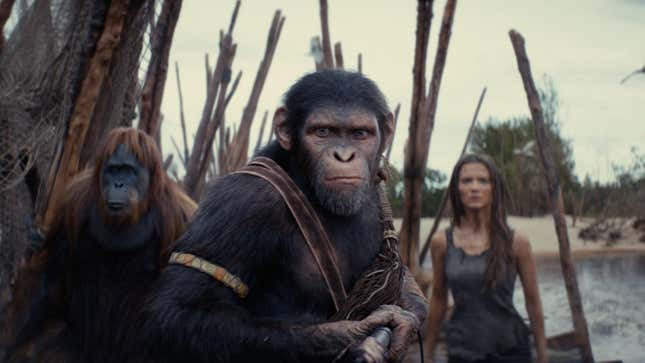
io9: You mentioned how Caesar’s ideas play an important part in the movie. Talk about tracking and balancing his influence on this time and these characters.
Ball: That was the interesting idea because of the time jump. In our own human history, we’ve had plenty of lost knowledge. We make these great discoveries, and then we lose it, and someone rediscovers it. I love the idea [that] there was a dark ages after Caesar died and many things were lost. And how it can split. There’s even a deleted scene somewhere that had to cut for time, unfortunately, but we talked about that a little bit, the split that happened. And we had this great kind of two versions of Caesar in the movie embodied through Raka and through Proximus Caesar. And Noa, this fresh, blank page that sets off on this adventure of self-discovery and discovery for the world around him, he gets to be influenced by these two ideas. It’s going to shape him into the future going forward. Who he’s going to become is because of the father figures that come and go from his life in this movie, including his interactions with humans themselves. So it just felt like the right idea to play around with ideas and the concept of truth and how fragile it is.
io9: Apes with birds is a big part of the marketing for this movie. Where did that idea come from?
Ball: Yeah, it was just this idea. I’ve talked about it before, but, apes were in the Stone Age in the previous movies. Apes are entering the Bronze Age in this movie. Cultures, different worlds, evolution, mirroring our own as a species marching through civilization. And this idea of human beings domesticating dogs [into] man’s best friend shows their advancement, their ingenuity, all that kind of stuff.
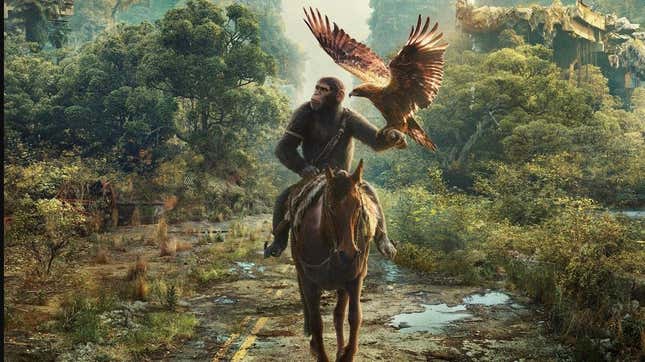
[So] I can’t do dogs, what do I do? I landed on eagles. Sweet! It’s a cool visual, and I just liked the idea. And this whole egg climb ritual came into my head right away, and just all that stuff that just felt like, “Oh, it’s almost a fantasy world that is very foreign but somehow you can read between the lines.” We don’t do a lot of exposition. We don’t explain a lot of it. You just have to infer a lot of it. And I think this is what you’re getting here.
io9: I’m also curious about the title. You made a joke online about how long it was—so, was that always the title?
Ball: I had two different titles. I came in when I was pitching and I had two pieces of concept art that I made. One was Empire of the Planet of the Apes, and there was Kingdom of the Planet of the Apes because there’s the whole idea that it was the first kingdom starting to form. This king, the first king ape. And obviously, we couldn’t do “Empire,” as cool as it sounds… We just kept trying to think about different things and [Kingdom] kept sticking. [But] I get it, I get it. They’re strange titles. It’s just that’s the way these movies go. You sort of suck it up.
io9: Earlier today I was speaking to Weta’s Erik Winquist [VFX Supervisor] and he spoke very highly of you and work.
Ball: I would do the same of him.
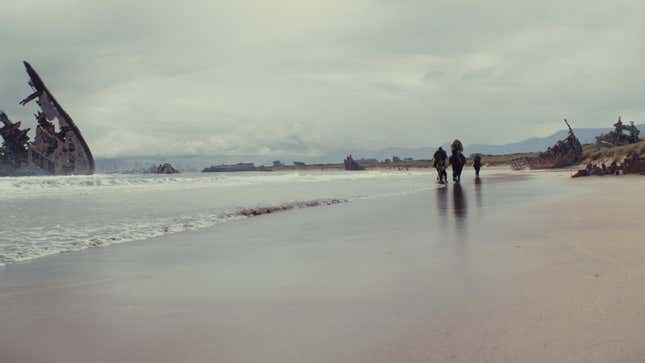
io9: I asked him if there was anything I should ask Wes about and he said to me “leeches.” What did he mean?
Ball: Oh, great. Well, one of our locations was a leech field. Everyone was just crawling with leeches and they got everywhere because you don’t feel them. So we’re shooting in these fields and it’s just like infestation. And people for days were like, “Oh, god” and suddenly you just see there’s a trail of blood on the bus as you’re going home and like, “Oh, crap.” And you realize there’s been a leech latching on to you and your foot is covered in blood. It was just one of the many sacrifices we made for the audience.
io9: Working with Weta, you have to think anything is possible, but also maybe not. Was there anything you came up with during writing or development that you came up with but simply couldn’t afford?
Ball: Yeah, there’s plenty of that.
io9: Give me one example
Ball: I wanted to do the greatest horse chase. Basically, a car chase on horseback is what I kept pitching it as. It could be awesome. It was taking place on the remains of an old Los Angeles freeway system. They’re all interchanging and they’re collapsing and it was nuts. I prevized it, I storyboarded it, and it’s freaking awesome. And I just could not afford it. It was too much.
io9: Oh, that reminds me that we do see the characters cross LAX [Los Angeles International Airport] for a second. How did that come about?
Ball: Yeah, just one of the cool discoveries. That’s a perfect example of how we thought, “blink and you miss it.” You don’t even realize that you’re in the remains of a world anymore. [Earlier] he falls through and you realize, “Where am I?” And it slowly comes into focus and finally in the very end, as you’re leaving, you realize where it is you are. That was just a cool idea throughout the movie [where] we do that.
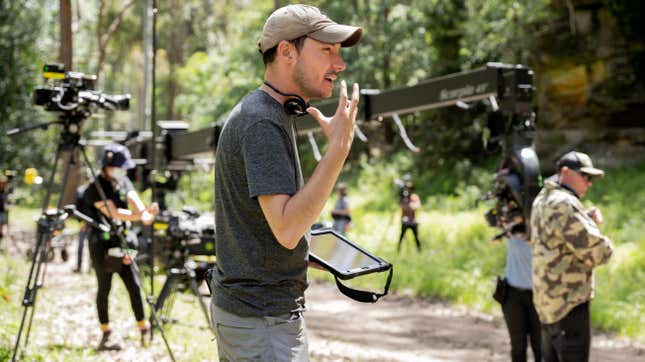
io9: As someone who used to have a Legend of Zelda room in their house, I have to bring up the fact you are attached to make that movie. I know you can’t say anything about it but you talked earlier about initially being cautious about making this movie. Zelda is on a whole other level in terms of responsibility. What can you say about how you decided “Yes, I can do this. I’m the guy.”
Ball: It’s the same thing I learned on The Maze Runner movie on a smaller scale. I think it had sold like five million copies of books when we started that movie. But the fan base was loud and intense. And so I learned a little bit of that. Expectations came there and they told me when I got it wrong. Same thing on this one. And I understood. I don’t have blinders on. I know what I’m going into. I would not have done it unless I thought I was capable of doing it. I wouldn’t have done this movie if I didn’t think I was capable of doing it. Hopefully I have. We’ll see. But I grew up playing Zelda, dreaming about Zelda, thinking about Zelda. It’s an important thing to me, so I will do my best to not mess it up.”
io9: You also said that you were hesitant to do this movie until you had an idea that made you excited to do it. Did that happen on Zelda as well?
Ball: No. I’ll say it’s been many years.
io9: Obviously I’m hoping that you pick up that Master Sword tomorrow, but, assuming that’s not going to happen, do you plan on working on a new Apes movie? Would you even like to? What is next for you?
Ball: I would be lucky, obviously, to do it. We’d want to get it right. So I think that’s the beauty of it. We can take our time to get it right. And I don’t think this is a franchise that has to be made tomorrow. So, we’ve got ideas where we want to go [and] we’re gonna keep marching forward if it’s successful, [and] whether there’s an appetite for it.
Check back next week for more from Ball. Kingdom of the Planet of the Apes is in theaters Friday.
Want more io9 news? Check out when to expect the latest Marvel, Star Wars, and Star Trek releases, what’s next for the DC Universe on film and TV, and everything you need to know about the future of Doctor Who.
Trending Products

Cooler Master MasterBox Q300L Micro-ATX Tower with Magnetic Design Dust Filter, Transparent Acrylic Side Panel, Adjustable I/O & Fully Ventilated Airflow, Black (MCB-Q300L-KANN-S00)

ASUS TUF Gaming GT301 ZAKU II Edition ATX mid-Tower Compact case with Tempered Glass Side Panel, Honeycomb Front Panel, 120mm Aura Addressable RGB Fan, Headphone Hanger,360mm Radiator, Gundam Edition

ASUS TUF Gaming GT501 Mid-Tower Computer Case for up to EATX Motherboards with USB 3.0 Front Panel Cases GT501/GRY/WITH Handle

be quiet! Pure Base 500DX ATX Mid Tower PC case | ARGB | 3 Pre-Installed Pure Wings 2 Fans | Tempered Glass Window | Black | BGW37

ASUS ROG Strix Helios GX601 White Edition RGB Mid-Tower Computer Case for ATX/EATX Motherboards with tempered glass, aluminum frame, GPU braces, 420mm radiator support and Aura Sync










